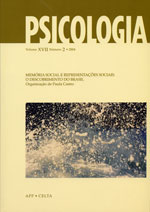Living social representations of the discovery of Brazil: Updated social memory of Portuguese and Brazilians
DOI:
https://doi.org/10.17575/rpsicol.v17i2.457Keywords:
-Abstract
In this paper we evidence important aspects of the process of updating Portuguese and Brazilian social memory concerning the discovery of Brazil. This social memory is described in terms of social representations, i.e., those active in the two populations on the occasion of the commemoration of the fifth centennial. Thus, we applied questionnaires of similar characteristics on several subjects related to the discovery and to the colonization of Brazil--historical, economical, political, and cultural--to 500 Portuguese subjects in Lisbon and to 789 Brazilian in seven different cities of the country, all adults of both sexes, with at least eight years of education. Some of the main results of this study were the following: (1) two thirds of the Brazilian subjects and a third of the Portuguese state the discovery of Brazil as one of the three most outstanding factors of the history of these countries; (2) most of the Portuguese attribute the discovery of Brazil to random factors, while most of the Brazilians represent it as a result of an intentional action; (3) for the Brazilian sample, a smaller proportion of the favourable characteristics of Brazil and a larger proportion of the unfavourable ones are due to the European influence, in comparison with the native and African influences; (4) the Brazilian culture is represented both by Brazilians and Portuguese as a fusion of European, indigenous and African cultures; (5) more than half of the Brazilian and Portuguese samples blame the reduction of the indigenous population to the slaughter commanded by the colonizers, as well as other important factors such as the wars among rival tribes, for the Portuguese, and the diseases brought by the Europeans, for the Brazilians; (6) as for the feelings associated to the memory of the events of five hundred years ago, the Portuguese feel mainly proud or, in smaller proportion, indifference, while the feelings of the Brazilians are distributed among revolt, shame, but also pride and indifference; (7) for the Portuguese, the main source of representations of the discovery is school learning, followed by television, that are also important sources for the Brazilians, but in smaller degree, because newspapers, magazines and recent book publications contribute equally to the updating of this social memory; (8) nevertheless, half of the Brazilian sample, as much as the Portuguese, does not see a lot of difference among what is spoken today about the discovery and what remembers to have read in school manuals; (9) among the ones that reject the term "discovery", most of the Portuguese would prefer to substitute it for "encounter among two civilisations", while, in a larger proportion, the Brazilians judge more appropriate to speak of "invasion" or "conquer"; (10) finally, almost the totality of the Portuguese and two thirds of the Brazilians are favourable to the commemoration of the discovery of Brazil in their respective countries. These comparative results are interpreted in terms of the reasons why the updated memories of a same remote event are similar, but also different and distant, in two linked populations by complex historical and cultural bonds.


